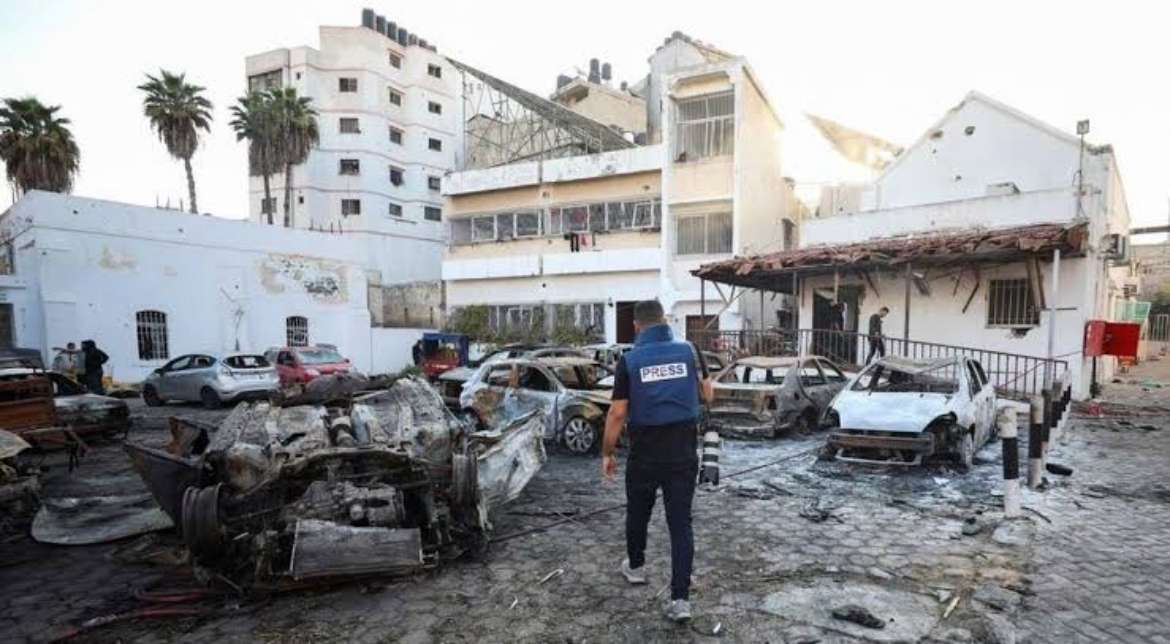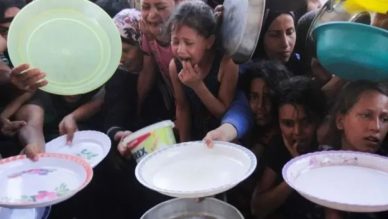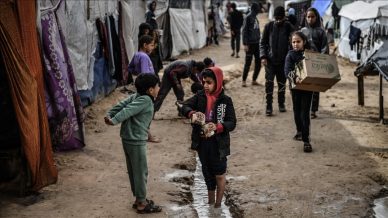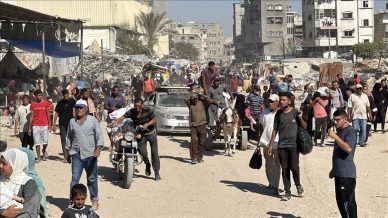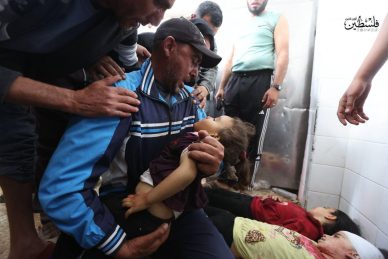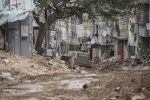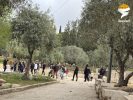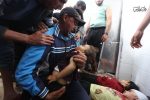GAZA, (PIC)
Kamal Adwan Hospital is facing a fate similar to that of the Al-Shifa Medical Complex during the first months of the war of genocide on Gaza. However, the future for the hospital located in Beit Lahia looks bleaker considering the ongoing ethnic cleansing and forced displacement in northern Gaza under Israeli firepower, aimed at creating a buffer zone.
The Ministry of Health in Gaza reported on Saturday night that the Israeli occupation forces ordered the immediate evacuation of Kamal Adwan Hospital, instructing its personnel to head to the Indonesian Hospital.
Al Jazeera broadcast exclusive footage showing women and injured children crowded in one of the hospital’s corridors after all rooms and departments were subjected to gunfire and shelling from Israeli vehicles encircling the hospital.
Images showed the occupation forces firing directly at the hospital, where dozens of medical staff, injured individuals, and patients, including children and women, were present.
The military actions being carried out by the occupation army against Kamal Adwan Hospital suggest that the hospital faces a fate similar to that of the Al-Shifa Medical Complex on March 19, 2024, when the army stormed the largest medical complex in Gaza and ordered patients, medical staff, and displaced individuals inside it, as well as residents in the vicinity, to leave their homes and forcibly relocate southward.
However, the difference between the two locations is the ethnic cleansing being perpetrated against the residents of Beit Lahia, where the occupation army is systematically demolishing homes as part of what is called the generals’ plan to create a buffer zone along the security fence separating Gaza from the adjacent settlements.
On the edge of the abyss
Dr. Hussam Abu Safiya, director of Kamal Adwan Hospital, said that the Israeli occupation army is directly bombing the hospital without prior warning, adding that the army requested the evacuation of the hospital within hours.
Abu Safiya held the international community responsible for the actions of the occupation forces in Gaza, confirming that the occupation army targeted the third floor of the hospital with artillery shells, though no injuries occurred.
He emphasized that the hospital has not received the necessary maintenance supplies to sustain electricity, water, and oxygen, despite promises.
Abu Safiya pointed out that the World Health Organization managed to send only 70 units of blood, while the hospital needs 200 units.
He stressed that the occupation army has not allowed the entry of all required supplies and has prevented medical staff from entering, amid a severe shortage of supplies, medical devices, medications, and painkillers.
He also highlighted that food is extremely scarce, saying, “We cannot provide meals for the injured. We call on the world to intervene urgently to allow food to be provided so we can at least offer one meal a day to the injured who clearly need nutrition during their recovery, and also for the medical team working around the clock.”
This is not the first time the hospital has endured an Israeli fire blockade. Since the beginning of the third ground invasion of northern Gaza on October 5, 2024, the hospital has repeatedly faced artillery bombardments and assaults on its medical staff, including an attempted assassination of its director, Abu Safiya (on November 24), who lost his son Ibrahim to Israeli sniper fire after refusing to evacuate the hospital.
A series of systematic attacks
On October 28, the occupying army besieged the hospital for five days, arresting 40 doctors and nurses from the medical staff of the only main hospital in northern Gaza. Only the hospital’s director, Dr. Hossam Abu Safiya, and one pediatrician remained. This prompted the Ministry of Health to appeal to international organizations to quickly send surgical medical teams to the hospital and to call on anyone with surgical skills to join them to save what can be saved from the wounded and sick.
Prior to this, on October 25, Israeli artillery bombed the oxygen station of Kamal Adwan Hospital, resulting in the deaths of two child patients in the intensive care unit. Less than an hour later, occupation forces stormed the hospital courtyard and demanded that all those present—wounded, companions, and displaced persons—leave the hospital grounds, assaulting several individuals before communication with the hospital was completely cut off, according to the Al Mezan Center for Human Rights.
On December 19, the occupying army demolished several houses around Kamal Adwan Hospital. Dr. Abu Safiya reported that this night was one of the hardest, as the occupation forces used remotely controlled robots equipped with explosives to target the area near Kamal Adwan Hospital, causing significant fear and anxiety among the patients and injured within the hospital. This also led to the destruction of doors and windows and damaged most of the water tanks on the hospital roof. Additionally, airstrikes carried out by the occupying forces injured three members of the medical team at the hospital.
According to data published by the Euro-Med Human Rights Monitor, the occupying army targeted Kamal Adwan Hospital more than 20 times between December 1 and 12, injuring several medical staff members as well as patients and their companions.
The report warns that the Israeli occupying army is systematically and clearly targeting the few remaining medical teams in northern Gaza, exacerbating the difficulty of providing health services to tens of thousands of besieged residents while also continuing to prevent civil defense and ambulance teams from operating.
The Monitor said that its examination of records and lists of victims of Israeli targeting indicates a systematic and widespread policy aimed at killing and assassinating Palestinian competencies and elites in various sectors, alongside the extensive killing of tens of thousands of Palestinian civilians.
Unrelenting war
On December 17, the United Nations reported that the occupying authorities had once again rejected three humanitarian missions planned to deliver food and water to parts of besieged northern Gaza, confirming that the situation regarding sending missions to the north remains extremely difficult.
For its part, the World Health Organization announced that it was able to access Kamal Adwan Hospital in northern Gaza on December 17, despite ongoing hostilities and explosions in the vicinity of the hospital.
In a post on social media, WHO Director-General Dr. Tedros Ghebreyesus explained that this access came after four missions failed the previous week to reach the hospital due to Israeli occupation refusals.
He reported that the team that arrived at Kamal Adwan managed to deliver 5,000 liters of fuel, as well as food and medicines. The team also transferred three patients and six of their companions to Al-Shifa Hospital.
He warned that the hostile actions of the occupying army around Kamal Adwan Hospital and recent attacks have caused further damage to the hospital’s oxygen supplies and generators.
On November 30, a mission from the organization was able to reach the hospital for the first time after weeks of failed attempts, delivering aid and sending an emergency team that included surgeons and medical experts. However, the team had to leave the hospital a few days later due to escalating violence around the facility.
Ghebreyesus cautioned that the departure of the medical team left the hospital without specialists in surgery and maternal care, noting that the ongoing attacks have caused additional damage to the infrastructure and oxygen and electricity supplies.
Where is international law?
Kamal Adwan Hospital is one of the last functioning medical facilities in the northern sector, facing significant challenges amid the war. The World Health Organization had earlier warned this month that the hospital barely provides “the minimum” of services.
International law provides general and specific protection for civilian sites according to the Fourth Geneva Convention and the Additional Protocols I and II of the Geneva Conventions of 1977 and The Hague of 1954.
This protection includes civilian sites such as homes, schools, universities, hospitals, places of worship, and other facilities protected under this law. Hospitals receive special protection under the Fourth Geneva Convention; attacks on civilian hospitals providing care for the injured, sick, elderly, and women are absolutely prohibited, and the law requires respect for and protection of these hospitals.
The same convention adds that the protection due to civilian hospitals cannot be suspended, and all four Geneva Conventions obligate all parties to collect the injured and sick and care for them.
Accordingly, random or targeted attacks on hospitals, medical units, and medical personnel working in a humanitarian capacity are never permitted.
Deliberate attacks against hospitals and places where patients and the injured gather constitute a serious violation of the laws and customs of war under the Rome Statute.
Under the Rome Statute of the International Criminal Court, intentionally directing attacks against hospitals and places where individuals and the injured gather is considered a war crime.
With U.S. support, the Israeli occupation has been waging a genocidal war on Gaza since October 7, 2023, resulting in more than 152,000 martyrs and injured, the majority of whom are women and children, and thousands missing under rubble and on the streets, where Israeli occupation forces prevent ambulance crews from reaching them, along with massive destruction of infrastructure.

